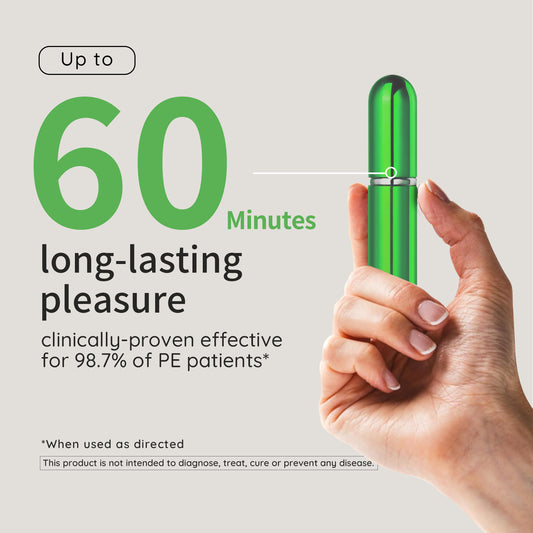Performance anxiety is a common issue that impacts men across all age groups.

Sexual performance anxiety stems from prolonged stress.
Regardless of whether this stress originates from self-doubt, a lack of confidence, or a fear of failure, it presents significant challenges for individuals of all genders.
Continue reading to explore the symptoms, causes, and treatments aimed at reducing and eventually overcoming sexual performance anxiety.
What exactly constitutes sexual performance anxiety?
Sexual performance anxiety manifests as apprehension or doubt regarding one's sexual capabilities. It arises from negative thought patterns, exacerbating feelings of self-doubt and insecurity surrounding sexual activity.
While often linked with men, studies indicate that performance anxiety can play a significant role in the onset and persistence of sexual dysfunction in both genders.
Symptoms
Sexual performance anxiety involves a multifaceted mental state accompanied by a range of physical and emotional symptoms.
Despite a strong desire to engage sexually with your partner, negative thought patterns hinder progression.
A surge of adverse emotions triggers stress and anxiety. In stressful scenarios, our bodies instinctively respond with a 'fight or flight' reaction.
Causes
Negative or intrusive thought patterns frequently underlie sexual performance anxiety.
These thoughts often initiate a self-reinforcing cycle of anxiety, amplifying sensations of self-doubt, insecurity, and sometimes even sexual inadequacy.
Sexual performance anxiety can arise from various factors, including:
- Engaging in sex for the first time
- Initiating sex with a new partner
- Receiving negative feedback from a dissatisfied sexual partner
- Previous sexual encounters perceived as 'unsatisfactory' or 'failed' (such as experiencing loss of erection)
- Concern about one's ability to satisfy their partner
- Self-doubt or a lack of confidence
- Body image concerns
- Low estrogen levels (primarily affecting women post-pregnancy or during menopause)
- Medical conditions or chronic health issues (e.g., cancer treatment, medication side effects, diabetes, cardiovascular disease, etc.)
The stigma associated with sexual dysfunction or challenges is particularly pronounced, especially among men.
Esther Perel, a psychotherapist and human relationship specialist, notes that while women can also experience sexual performance anxiety, men tend to be more vulnerable to it.
Traditionally, men face societal pressure to embody traits of tirelessness, mastery, and dominance in sexual encounters. Consequently, their identity and self-worth often become intertwined with their sexual performance. Consequently, experiencing difficulties in the bedroom can lead to a profound sense of failure as a man.
If left unaddressed, sexual performance anxiety can have significant implications for mental health and overall well-being.
Treatments
Addressing and overcoming symptoms of psychological complications typically involves engaging with your mental state.
Given that sexual performance anxiety primarily stems from negative thought patterns, altering these thoughts can lead to behavioral change.
Here are several practical approaches to achieve this
Take a gradual approach to your sexuality
When contemplating sex, avoid fixating on the end goal. Pressuring yourself with thoughts of pleasuring your partner or achieving orgasm can detract from the moment.
If your mental state impedes your ability to enjoy intimacy, consider adopting a gradual approach to sex.
Relationship expert Chantal Heide recommends navigating your sexual experiences step by step. Begin with activities like massage or kissing during moments of arousal before progressing to foreplay.
Approaching sexuality in stages aims to let your body lead the way and explore what feels right in the moment. It also opens up opportunities for diverse and enjoyable sexual activities beyond intercourse alone.
Initiate an open and honest dialogue with your partner
If sexual anxiety symptoms are affecting your relationship, it's crucial to discuss them with your partner.
Despite potential feelings of shame, uncertainty, or frustration stemming from past experiences, initiating a conversation can alleviate much of this stress and aid in overcoming symptoms.
When discussing the issue, prioritize honesty, refrain from blaming or becoming defensive, and explain to your partner how performance anxiety impacts you both in and out of the bedroom.
Regularly assess your current mood or emotional state
Engaging in daily check-ins can be a valuable technique for addressing sexual performance anxiety. When feelings of anxiety, depression, unattractiveness, or distraction arise, it's natural to experience a lack of arousal or desire for sex.
Regular check-ins enable you to understand the reasons behind your emotions, regulate them effectively, and enhance your ability to manage stress.
Strive for self-acceptance and self-love
Embrace self-acceptance as a precious gift to yourself. Releasing the pursuit of perfection can bolster confidence, reduce self-doubt, and shield you from self-criticism.
American psychotherapist Alexander Lowen emphasized, 'Change is possible, but it must begin with self-acceptance.'
By confronting fears and embracing your true self, you empower yourself to overcome sexual performance anxiety.
Recognize the significance of mindfulness
With the foundational concepts of overcoming sexual anxiety explored, let's now turn our attention to mindfulness.
Mindfulness serves as a potent therapeutic approach, directing your focus inward and grounding you in the present moment. Peer-reviewed research indicates its efficacy in alleviating symptoms of anxiety, depression, and various other mental health conditions.
In the context of sexual performance anxiety, apprehension about future outcomes can inhibit sexual engagement. Through mindful practice, you can confront these fears and disrupt the negative thought patterns contributing to sexual anxiety.
Here are three mindfulness techniques to implement
Meditation
Meditation involves training our awareness to turn inward, fostering mental clarity, balance, and stability. Mindfulness meditation specifically aids in reclaiming control over the mind and body by guiding us to release negative thoughts.
Achieving mindful meditation in five straightforward steps:
Step 1: Locate a tranquil, cozy spot for your practice.
Step 2: Set a timer for 5 minutes.
Step 3: Inhale deeply through the nose for 4 seconds, hold for 7 seconds, and exhale forcefully through the mouth for 8 seconds.
Step 4: Permit thoughts to flow without becoming entangled in them.
Step 5: Deepen your self-awareness with each breath.
Engage in mindful focus during masturbation
For males grappling with symptoms of erectile dysfunction, which often fuel sexual performance anxiety, mindful focus during masturbation can serve as a potent form of meditation to confront and mitigate these detrimental thought patterns.
Start by reclining, practicing deliberate, slow breathing, and consciously easing tension from every muscle in your body. Employ your imagination to vividly recall a past sexual experience. Maintain your concentration on this memory as you engage in masturbation, allowing yourself to become fully immersed in the emotions and sensations that arise as arousal intensifies, all without succumbing to distractions.
Embrace the process without haste, relishing each moment regardless of its duration.
Yoga
Yoga offers a wealth of benefits, including increased strength, flexibility, and vitality. Beyond physical improvements, this practice, akin to meditation, can also enhance sexual function.
Healthcare expert Dr. Anita Sadaty notes that yoga's positive effects extend to both men and women by improving blood pressure, enhancing arousal, and reducing stress hormone production.
Serving as a potent form of sexual medicine, yoga can be practiced individually or with a partner, fostering emotional intimacy and connection.
Exercise
Engaging in exercise is an essential initial stride toward enhancing both physical and mental well-being. A 2015 research investigation examining mindfulness and healthy behaviors discovered that individuals who adhered to an exercise regimen for an extended period exhibited higher scores in measures of mindfulness and self-acceptance.
Exercise triggers favorable physiological responses, including elevated heart rate and improved blood circulation, which in turn can bolster sexual desire and alleviate symptoms of erectile dysfunction in men.
Knowing when to seek professional assistance is crucial
Recognizing the persistent impact of negative or intrusive thought patterns on sexual anxiety, it's important to acknowledge when self-management proves challenging. Seeking professional medical guidance can offer valuable support.
Psychotherapy presents a valuable option for addressing diverse anxiety disorders and medical conditions.
Cognitive Behavioral Therapy (CBT) stands out as a particularly effective form of psychotherapy. It involves evaluating thought patterns and employing therapeutic techniques such as role-playing, relaxation exercises, journaling, and more. CBT has demonstrated efficacy in treating various sexual dysfunctions, including erectile dysfunction and premature ejaculation.
KEY TAKEAWAYS:
1. Negative or intrusive thoughts often underlie sexual performance anxiety, making sexual activity challenging.
2. Sexual anxiety can affect both men and women, albeit more commonly observed in men.
3. Symptoms may include rapid heart rate, dry mouth, trembling, nausea, vaginal dryness, and erectile dysfunction.
4. Treatment involves addressing negative thought patterns and adopting mindful techniques like meditation, yoga, and exercise.
5. If symptoms worsen and impact mental health, seeking professional medical guidance is advisable.
FAQS
How do you cure sexual performance anxiety?
There is a wide range of remedies to help you address and cure sexual performance anxiety. Effective treatment options include exploring new acts of intimacy, being open and honest with your partner, focusing on self-acceptance and actively engaging in activities that help you de-stress and get you out of your head.
Should I take Viagra for performance anxiety?
Although viagra can help men achieve and maintain an erection during sexual intercourse, it's ineffective in targeting the underlying issues. Instead, addressing the root cause of these challenges is better to help you overcome and eliminate sexual performance anxiety.
Do I have performance anxiety?
Some tell-tale signs of sexual performance anxiety include stress, dread or anxiety towards intimacy, lack of interest or engagement in sexual activities, or negative or intrusive thoughts about sex. Men often experience premature ejaculation during sex or have difficulties achieving or maintaining an erection, while women experience vaginal dryness.
 Buy Now
Buy Now



